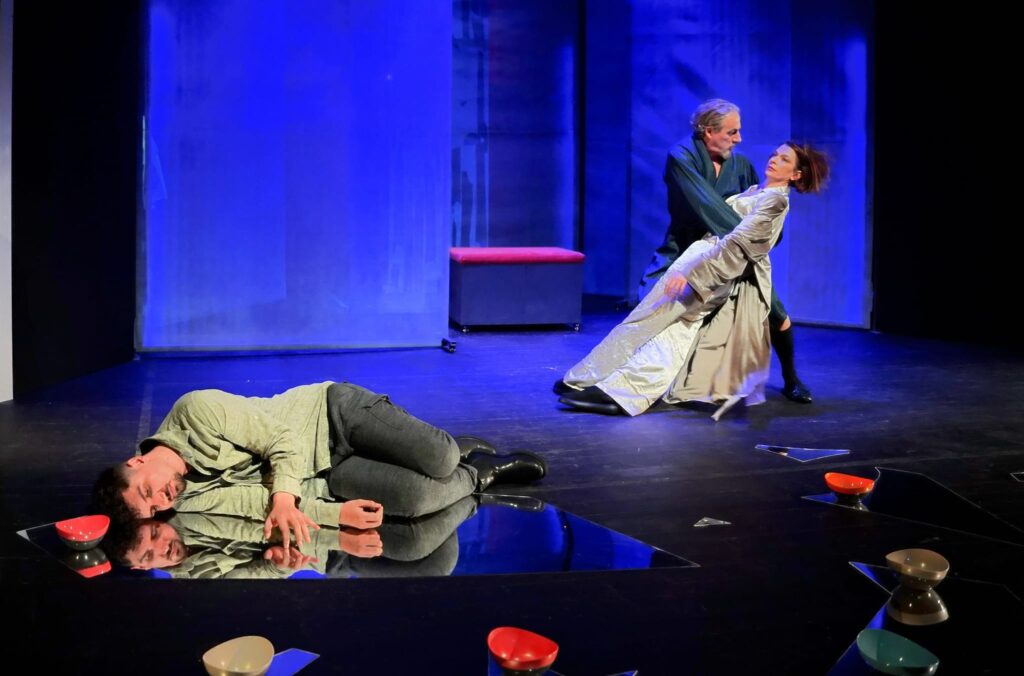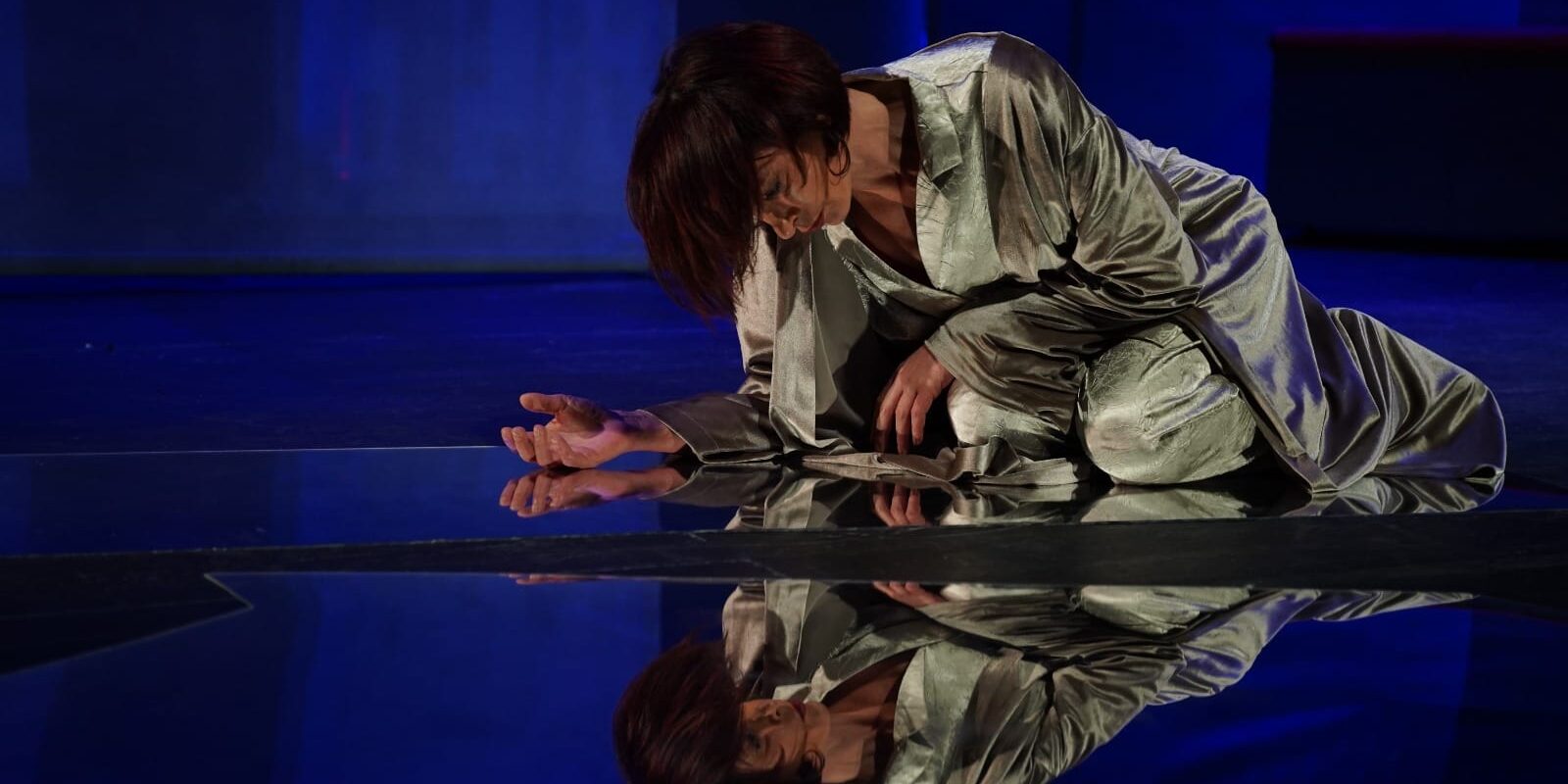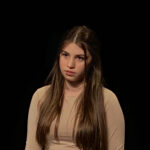National Experimental Theater “Kujtim Spahivogli”, Tirana, premiere 19th January 2024
Feeling lonely and convincing yourself that you have been abandoned can cost you a lot, emotionally; it can even cost your mental health. Florian Zeller’s 2010 play The Mother, the first in a trilogy that would also come to include The Father and The Son, sees the French playwright exploring this dark corner of the human psyche, the place from where the deepest fears tear through the walls of the subconscious. In the play, Zeller examines this frightening process in the play through the character of a woman who feels deeply that she does not deserve to be abandoned.
The Mother received its Albanian premiere at the Experimental Theater in Tirana, directed by Mehmet Xhelili. It is as if he has taken the essence of the work, put it in a laboratory, and taken advantage of the chemical reactions that ‘the mother factor’ causes in the audience, to create an evocative and rich production. The work features experimental elements and a more expressionistic aesthetic, with every detail, from the scenography to the performances, serving to amplify the emotions of the character of the mother.
Ema Andrea plays Anne, the mother of the title. She masters the role of an abandoned woman, dealing with emotional and existential crises, under the pressure of menopause and mental degradation. A character of this level of complexity requires a physical plasticity and detailed emotional motivation and Andrea impressively achieves this. The relationship with her son Nicholas (Xhuliano Brisku) is fragile, dark, and a little Oedipal; sometimes she treats her son as a small child, sometimes she provokes him sexually, and displays jealousy towards Nicholas’ girlfriend Elodie (Enisa Hysa) who is also confused with the character of Klara, the daughter of Anne and her husband Peter (Helidon Fino).

The Mother – Experimental Theatre, Tirana
The relationship between Peter and Elodie is complicated and raises many logical questions, especially in some scenes where it is indirectly implied that Elodie had a sexual affair with Peter – but I firmly believe that the subtext was that of an Elektra complex, thus completing the sense of suppressed feelings with incest tendencies within this family. It would have been beneficial, however, if Fino and Hysa could have developed the roots of this father-daughter relationship more deeply.
The production’s scenography and use of video, by Albert Dedja, is impressive. There are translucent walls, scattered broken mirrors, and parallel doors, which all contribute to the atmosphere. Xhelili has skilfully used the scenography to evoke the psychological conditions in which the narrative is taking place. The translucent moving walls with a large clock projected in their centre increase the tension of the relationships between the characters, reminding them how difficult it is to penetrate each other’s souls. Other elements capture the themes of the play: the broken mirrors scattered on the floor, which reflect the broken image of the mother; the bowls of food that are placed on these pieces of mirror and not on the table, as if to show that the only thing that comforted this broken woman were the memories of preparing her son’s breakfast – something which is elaborated on in her final monologue.
While some of the experimental elements work well, director Xhelili’s decision to resolve the fundamental moments of the show – including Anne’s breakdown – with choreography, is not so successful. The production feels overloaded with visual and symbolic elements. The best thing for the show would have been for the climax to be intense but also sincere. However, in some other moments the use of choreography complemented and supported the lack of communication between the characters.
As is typical of Zeller’s work, the play explores the line between illusion and reality (something he did very memorably in his play The Father). In this production, it feels as if the line between reality and Anne’s fantasy could have been made more distinct. Everything is conceived to be played inside the mother’s head with all the characters drawn according to her fantasies, fears and needs. Zeller’s goal is to create ambiguity, but since the whole show depends on this, facing up to reality would make the drama even more devastating.
The labyrinth that Zeller aims to create was well-portrayed in the play, as was the complexity of the characters. The Albanian audience, when faced for the first time with a play like The Mother, may have suffered a deep shock. While the show was aesthetically majestic, it was also powerful to experience and, for a woman, at times “exhausting” to behold as it rekindles the fear of being alone.
Credits:
Director: Mehmet Xhelili
Cast: Ema Andrea, Xhuliano Brisku, Enisa Hysa, Helidon Fino
Further reading: interview with Ema Andrea: “Freedom is not something that is given to you; it is something you fight for”








